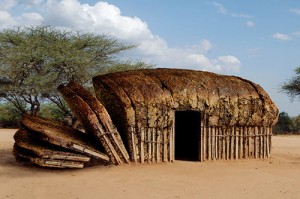From the Prophet Micah:
But you, O Bethlehem of Ephrathah,
who are one of the little clans of Judah,
from you shall come forth for me
one who is to rule in Israel,
whose origin is from of old,
from ancient days.
(From the Daily Office Lectionary – Micah 5:1 – October 13, 2012)
 This obscure little verse in the book of the Prophet Micah is best known to Christians from the story of the visitation of the wisemen in Matthew’s Gospel:
This obscure little verse in the book of the Prophet Micah is best known to Christians from the story of the visitation of the wisemen in Matthew’s Gospel:
In the time of King Herod, after Jesus was born in Bethlehem of Judea, wise men from the East came to Jerusalem, asking, “Where is the child who has been born king of the Jews? For we observed his star at its rising, and have come to pay him homage.” When King Herod heard this, he was frightened, and all Jerusalem with him; and calling together all the chief priests and scribes of the people, he inquired of them where the Messiah was to be born. They told him, “In Bethlehem of Judea; for so it has been written by the prophet: “And you, Bethlehem, in the land of Judah, are by no means least among the rulers of Judah; for from you shall come a ruler who is to shepherd my people Israel.’ “
I’ve always been intrigued by the word Ephrathah (which Mattew does not quote). Apparently it is a place name; one source indicates that Ephrathah, or Ephrath, is the ancient name for the town of Bethlehem in Judah, in the southern part of the land of Israel. Micah uses both names in order to distinguish the town from another Bethlehem in the north. Another source tells me the name means “fruitful”.
The name Bethlehem means “house of bread” which always intrigues Christians who see it as somewhat prophetic of Jesus words at the Last Supper identifying the bread as his own body.
When I hear that Ephrathah means “fruitful” I am immediately put in mind of two other verses of Scripture. First, God’s admonition to Adam and Eve in Genesis: “Be fruitful and muliply.” (1:28) The second is Christ’s admonition to his disciples: “I appointed you to go and bear fruit, fruit that will last, so that the Father will give you whatever you ask him in my name.” (John 15:16)
In the name of Jesus’ place of birth as set forth in Micah, I hear a call to evangelism. Nurture and sustained by what comes from the “house of bread,” we are “to go and bear fruit;” we are sent out to “be fruitful and multiply,” The fruit which we are to bear is an increase in followers of the Way, an increase in the number of disciples (not simply the fruit of individual good works, nor only the “fruits of the spirit” in our own lives). Our efforts, our ministries, our prayers, our daily lives are to be the means by which the “house of bread” will truly be “fruitful.”
====================
A request to my readers: I’m trying to build the readership of this blog and I’d very much appreciate your help in doing so. If you find something here that is of value, please share it with others. If you are on Facebook, “like” the posts on your page so others can see them. If you are following me on Twitter, please “retweet” the notices of these meditations. If you have a blog of your own, please include mine in your links (a favor I will gladly reciprocate). Many thanks!
====================
Father Funston is the rector of St. Paul’s Episcopal Church, Medina, Ohio.



Dear Father Funston, I came across your piece on Fruitful House of Bread as a result of searching for an image depicting Bethlehem as a House of Bread. I too have been fascinated by the mention of Ephrathah – meaning fruitful. I recently pondered its significance in relation to Bethlehem as a result of a Sunday School series I am writing on The Book of Ruth where it is mentioned in Ruth 1:2 “The name of the man was Elimelech, the name of his wife was Naomi, and the names of his two sons were Mahlon and Chilion-Ephrathites of Bethlehem, Judah. And they went to the country of Moab and remained there.”
It occurs to me that perhaps the reason Ephrathah is possibly not mentioned in Matthews Gospel is because it is distinguished by it being mentioned as Bethlehem, Judah. As you also comment we have been called to be fruitful in our Christian walk and so like Ruth and Naomi we have to make that journey towards the House of Bread. Jesus is the Bread of Life that came down from heaven and He is the Word made flesh and so we should continue to ‘eat’ His body – the Word of God if we are to be fruitful. Thank you for your piece.